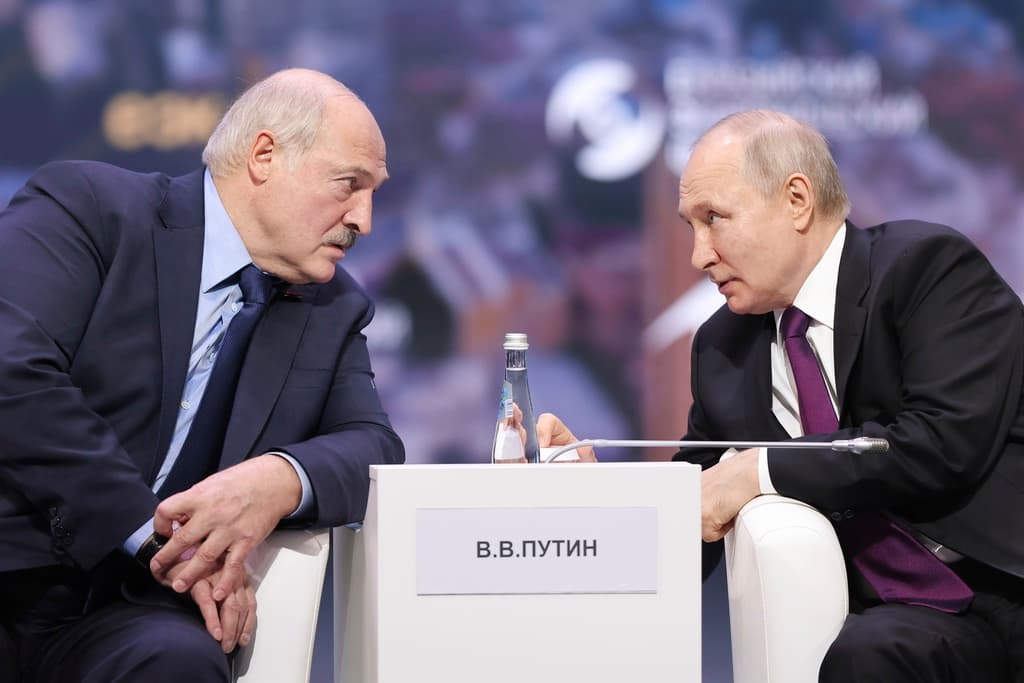Kremlin Infighting Intensifying as Putin Pumps Up Nuclear Threats
We may long for the days when Putin merely launched bloody wars and brazenly violated international pacts if one of the Russian extremists now jockeying for position at Moscow gets in power.

Even as President Putin amps up his nuclear threats in hopes of intimidating the West, the palace intrigue at Moscow is thickening, with Kremlin infighting intensifying. The latest incident involves the mercenary Wagner group handing over control of Bakhmut, Ukraine, to the Russian army.
The Russian defense minister, Sergei Shoigu, announced Thursday that Moscow intends to deploy tactical nuclear weapons to its satrap country, Belarus. The first such deployment in decades is widely seen as part of Russia’s response to Washington’s decision to provide F-16 fighter jets to Ukraine, and an attempt to weaken Western support for Kyiv.
America will not change its nuclear posture, the White House press secretary, Karine Jean-Pierre, told reporters in response. “This is yet another example of making irresponsible, provocative choices,” she said. “We remain committed to collective defense of the NATO alliance.”
Meanwhile in Ukraine, the Wagner chief, Yevgeny Prigozhin, who last week declared victory in the battle for Bakhmut, announced Thursday that he would pull out of the eastern Ukrainian town, where some 70,000 residents lived before months of fighting turned it into desolate rubble.
“We are withdrawing the units from Bakhmut,” a battle fatigue-clad Mr. Prigozhin announced in a video posted Thursday. “From today at five in the morning, May 25 until June 1, most of the units will rebase to camps in the rear. We are handing our positions to the military.”
In the video, Mr. Prigozhin noted that 10,000 Wagner soldiers were killed at Bakhmut. An additional 10,000 ex-convicts, recruited by the group from Russian prisons, also lost their lives in what has become known as a “meat grinder” battle over a town of no known strategic value that nevertheless became symbolic to both sides.
Kyiv officials say that parts of the battle-scarred town remain under Ukrainian control. Yet, Mr. Prigozhin is using its capture by Wagner recruits to taunt Mr. Shoigu, his arch-nemesis, whose army has stumbled at Bakhmut. Now, Kremlin watchers say, Mr. Prigozhin is making sure that the army will be blamed if Ukrainians recapture the town.
Deflecting possible future blame is “one of several reasons” for Mr. Prigozhin’s announcement, Ukraine’s ambassador at the United Nations, Sergeiy Kyslytsya, tells the Sun. Another possible motive may be that Mr. Prigozhin needs to “save Wagner’s strong units for the imminent internal struggle in Russia for survival and power.”
That fight, in the aftermath of many Ukraine war setbacks, is becoming nastier, with an increasing number of Moscow players jockeying for position. Mr. Prigozhin’s battle cry in recent days has become: “I love Russia, I don’t care about Shoigu, we will continue to fight.” At the same time, current and former officials, oligarchs, military types, and bankers are sniping at each other — and at the Wagner chief.
A former military intelligence officer, ultranationalist Igor Girkin, “even went so far as to say Prigozhin was ‘not Russian by nationality,’ insinuating that like the ‘majority of Bolsheviks,’ he was of Jewish origin, and posed a threat to Russia,” the Kyiv Post reports.
One way Mr. Putin has survived in power for decades has been pitting rivals against each other, positioning himself as the ultimate arbiter. Yet now, as the Ukraine war increasingly looks like a losing proposition, some of the rivals may already be eyeing a post-Putin era.
“What’s really concerning me is that the infighting is spreading beyond just a dispute between Shoigu and Prigozhin,” an eastern bloc watcher at the Foundation for Defense of Democracies, Ivana Strander, tells the Sun. “Whoever in the West thinks that after Putin Russia will be more democratic is mistaken.”
Mr. Putin is seen as unlikely to actually start a nuclear war. Ms. Strander says the deployment of tactical nuclear weapons to Belarus is meant to “freak out Europeans and Americans,” who, on the right and left, tend to oppose the West’s pro-Ukraine stance.
In 1994 the newly formed Russian Federation, Britain, and President Clinton’s America signed an agreement at Budapest with three former Soviet republics — Kazakhstan, Ukraine, and Belarus. The idea was to rid these now-independent countries of the nuclear weapons the Soviets had deployed on their soil. In return, Russia, Britain, and America would guarantee the territorial integrity of the three states.
Last year Mr. Putin violated the memorandum by invading Ukraine. The announcement Thursday that Russia would redeploy nuclear weapons in Belarus may constitute a second such violation.
It “runs counter to the commitment of Belarus, taken into account in the Budapest Memorandum, ‘to eliminate all nuclear weapons from its territory,’” the European Union’s ambassador at the UN, Olof Skoog of Sweden, told the Security Council in March, when Moscow and Minsk first made their nuclear agreement public.
Yet, if one of the Russian extremists now jockeying for position at Moscow gets in power, we may long for the days when Mr. Putin merely launched bloody wars and brazenly violated international pacts.

